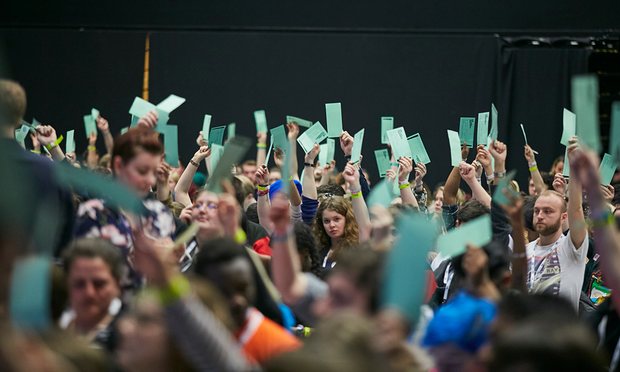Resumen: Los estudiantes han encontrado un arma en su batalla para evitar que el gobierno eleve aún mas las tasas de matrícula en una conferencia en Brighton han votado para sabotear dos encuestas claves, a menos que el gobierno retire las reformas pautadas. Los estudiantes afirman que van a boicotear la Encuesta Nacional de Estudiantes a menos que el gobierno retira su plan para un Marco de Excelencia en la Enseñanza, dicen los delegados de la conferencia NUS
Students have found a weapon in their battle to stop the government raising tuition fees still further: at a conference in Brighton they have voted to sabotage two key surveys unless the government withdraws its planned reforms.
The National Union of Students will boycott both the National Student Survey (NSS) and the Destination of Leavers from higher education survey (DLHE), which provide statistics the government needs to carry out its plans.
The government intends to introduce a Teaching Excellence Framework (Tef) which will rank universities on a range of factors, including how well students rate them in the NSS. The DLHE reveals what students are doing six months after graduation, and is used to determine a university’s “employability” rating.
Universities that do well in the Tef are likely to be allowed to charge higher fees. If the government refuses to abandon this plan, the NUS says it will mobilise students to campaign for a boycott.
Anastazja Oppenheim, from the National Campaign Against Fees and Cuts, said: “We know that if students, en masse, either refuse to fill in the surveys at all or sabotage it by giving artificially maximum or minimum scores, the results would become of little use and would wreck plans for the Tef. We hope it will act as a major disincentive for the government to go through with their agenda.”
Hope Worsdale, from the University of Warwick, added: “The NSS is used as a weapon to beat academic staff with, and as an excuse to cut to courses and close departments. The current reforms would further destroy public education as we know it, so it is fantastic news that the NUS has chosen to boycott these surveys in order to defeat them.”
However, students who voted against the motion are concerned that the boycott could alienate students from future consultations with the government.
Rosie McKenna, vice-president of academic representation at Edge Hill University, said the boycott “wasn’t very productive”.
“Voting for an amendment to the Tef motion, rather than completely disengaging with it, would have supported student unions better. It would have meant constructively engaging the government about the metrics we use,” she said.
Millie Thomas, a student at the University of Sunderland, doesn’t support the boycott because the NSS gives student unions valuable insights into what students think. “As a student officer, it’s the best way I can get information about students,” she says.
The campaign is due to start in September 2016, when the NUS plans to collect pledges from students that they will carry out the boycott if the government refuses their demands.






 Users Today : 59
Users Today : 59 Total Users : 35459965
Total Users : 35459965 Views Today : 74
Views Today : 74 Total views : 3418539
Total views : 3418539